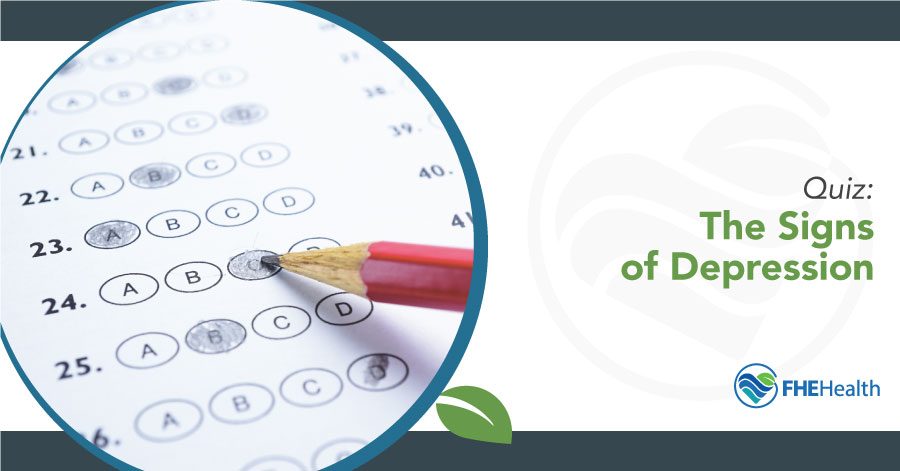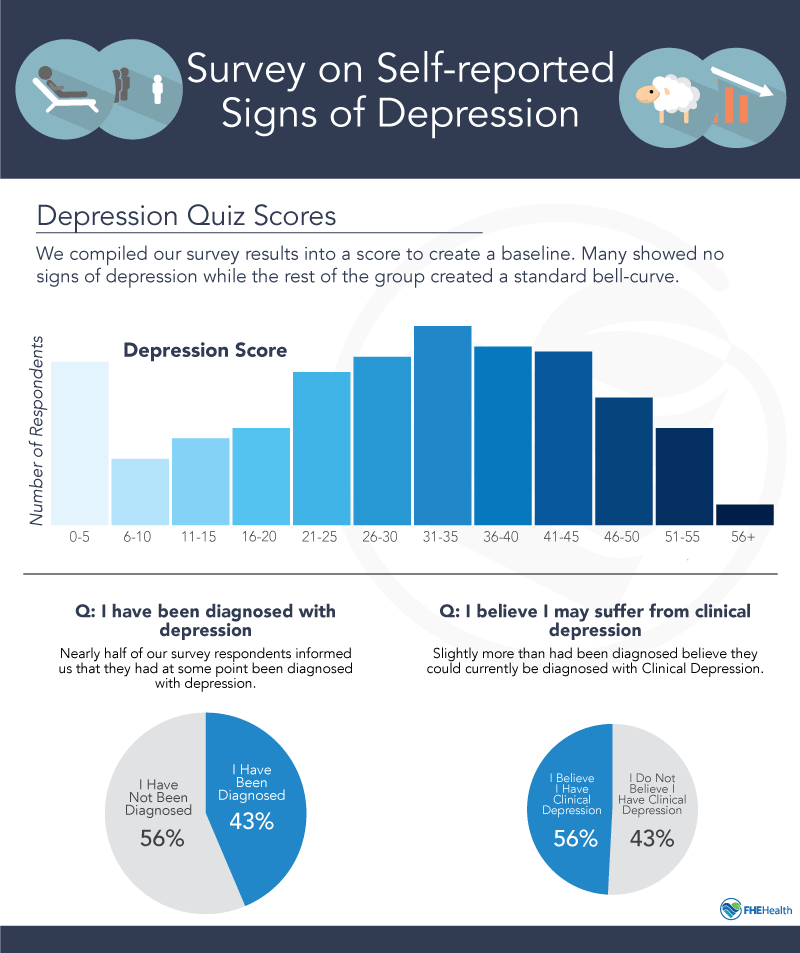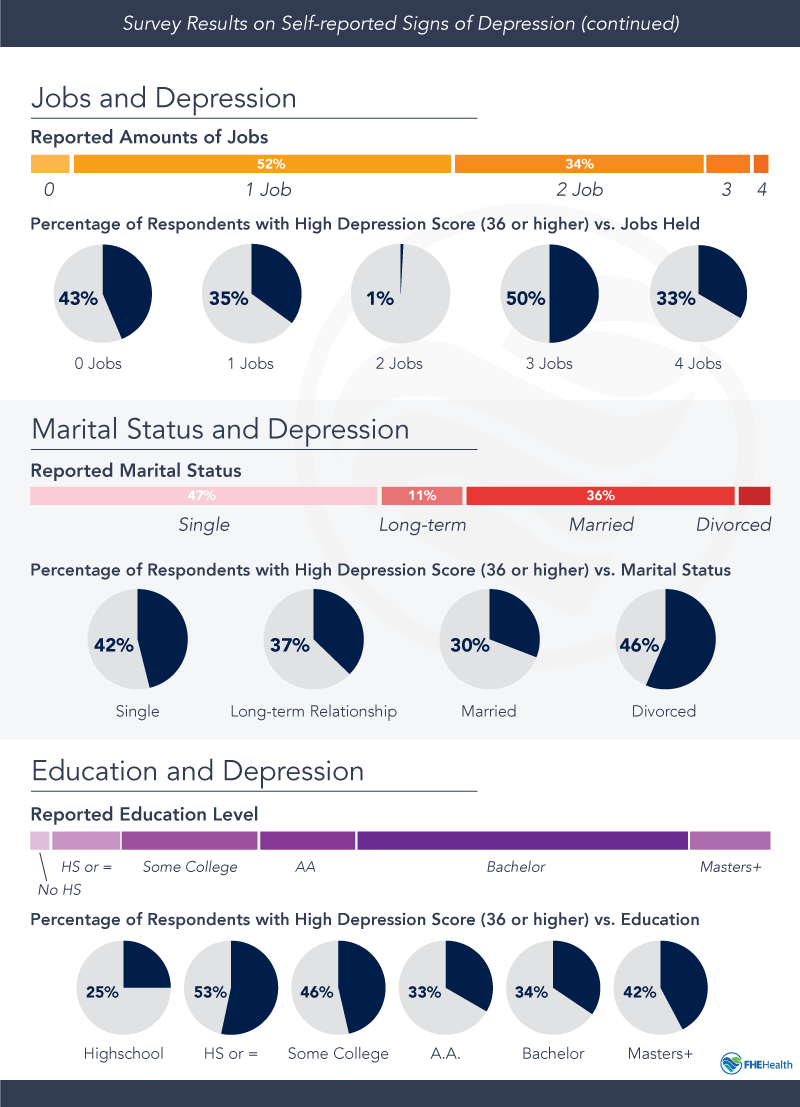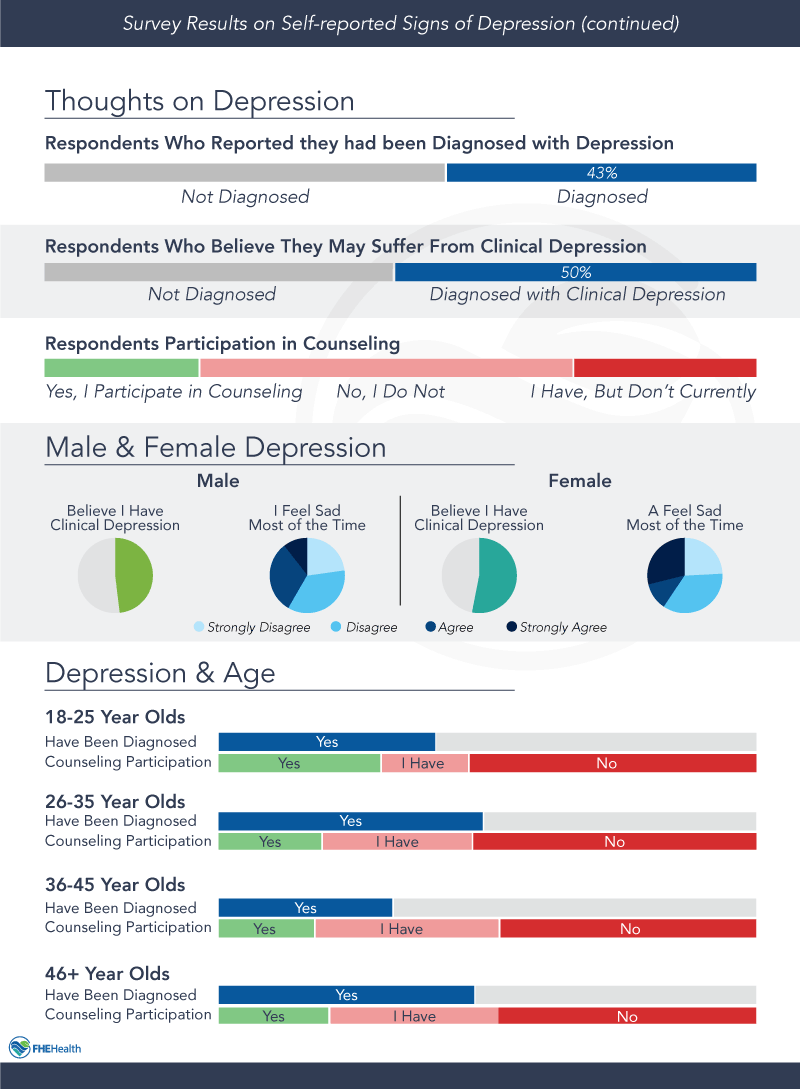
Everyone feels down, sad or just plain out of sorts sometimes, but when does the normal ebb and flow of your mood indicate a bigger problem? If you’re concerned that you may be showing signs of depression, this quiz can help you learn more about the warning signs. It can also help you better understand what your next steps should be if you’re at risk for clinical depression.
However, remember that depression can only be diagnosed by a trained professional. A quiz on the internet is never a suitable substitute for discussing your symptoms and life issues with your health care provider or a trained mental health professional. If you think you may be experiencing depression or you feel down or sad to a degree that’s interfering with your daily life, work or relationships, reaching out for help is critical.
For this quiz, we surveyed 300 people to get their answers to these questions so you can see how common your answers are. It can also help you see that you’re likely not alone in the feelings and thoughts you’re experiencing. This quiz is also self-contained, which means that we don’t collect or pass along any information you provide for any reason. It is strictly for your own use and purposes to help you better understand what your symptoms might mean.
Remember that there are no right or wrong answers. This is also not a diagnostic tool. Just be honest with yourself and answer each question as truthfully as possible. Click the button below to get started!



What Is Clinical Depression?
Depression is often referred to very casually by people throughout daily life. People might say “That’s depressing” or “I’m so depressed,” for example when speaking to friends or family. However, depression is a very serious mental health condition that can lead to death if not properly addressed. The term depression is used in the mental health field to refer to a wide range of mood disorders. You can have mild, moderate, or severe depression as well as seasonal depression, postpartum depression, and depression which is a symptom of other mental health conditions, such as bipolar disorder.
Clinical depression — also referred to as major depressive disorder and major depression — is one of the most severe forms of depression. It can also be one of the more difficult to treat. Before someone can be diagnosed with clinical depression, they need to undergo a thorough evaluation by their regular care provider and mental health professional. Depression can be caused by some physical issues in the body, so it’s important to rule out any underlying medical conditions before treating depression as a mental health concern alone. It’s also possible for depression to be caused by medications a person is taking for another condition; your primary care doctor can help determine if this might be the case.
According to the Diagnostic and Statistical Manual of Mental Disorders (DSM-5), a person must display some of the symptoms listed below to be diagnosed with clinical depression. The symptoms must also be deemed severe enough to be causing significant issues with a person’s daily life. Examples of this might be the person not being able to get out of bed and go to work, therefore missing shifts and possibly even getting fired, or an inability to function to a level required to properly care for children.
Symptoms of Depression
The symptoms of clinical depression include:
- Extreme feelings of sadness or hopelessness
- Feeling empty inside or dissociating from life
- Outbursts of anger, frustration, or tearfulness, even if the situation doesn’t seem to warrant that level of emotion
- Feeling agitated, anxious, or restless
- Feeling weighed down or having a lack of energy can even extend into slower movements, slower speaking, and slower thinking processes
- Changes in appetite and/or weight, including gaining or losing a significant amount of weight without trying
- Increased instances of physical aches and pains that are not able to be explained
- Difficulty concentrating, memory lapses, and not being able to make decisions
- Changes in sleep, including sleeping more, insomnia, having difficulty falling asleep, and/or frequent wakings
- No longer participating in previously enjoyed hobbies
- Feeling guilty, worthless, or like a failure
- Suicidal ideations or attempts
Anytime you are having thoughts of harming yourself, it’s important to seek immediate help. At FHE Health, our team can help you understand your symptoms and help you get the treatment you need.
Statistics of Depression
When you’re suffering from depression, it can feel like you’re all alone, but the truth is that depression and the feelings associated with it are far more common than you might think. More than 16 million people in the United States alone are struggling with depression right now, according to the Anxiety and Depression Association of America (ADAA). Globally, this translates to around 264 million people. A full 6.7% of the adult population in the United States has been diagnosed with depression, and it’s also the number one cause of disability for Americans aged 15 to 44.3.
Some common trends for depression sufferers are listed below.
- Women are more likely to have depression, with 8.7% of women being diagnosed with depression compared to 5.3% of men.
- Depressive episodes are most common from 18 to 25.
- Around 66% of those who commit suicide are depressed.
Another scary statistic is that less than half of those who have been diagnosed with depression go on to get help in a clinical setting. Common reasons someone might not get help for their depression include:
- Fear of what happens once they start treatment, such as becoming dependent on meds or being diagnosed with other mental health conditions (called co-morbid conditions)
- The potential cost of the initial treatment
- Ongoing costs such as prescriptions or counseling sessions
- Fear of their family or friends finding out that they have depression and facing the stigma that may be associated with that
Parents may be afraid that they will be seen as unfit or risk losing their children if they are honest about their feelings and thoughts and try to get help. Read more about the statistics of depression.
Getting Help
As the statistics above show, symptoms of depression are extremely common, and even clinical depression is more prevalent than many people might think. And while there has been much progress in fighting the stigmas associated with mental illness in recent years, many people are still reluctant to honestly say they are not okay and reach out for help. Going through the steps to see if you fit the diagnostic criteria for clinical depression may seem daunting, but it’s an important step toward getting the help you need and leading a healthier, more fulfilling life.
Once you are officially diagnosed with clinical depression, your mental health care professional will work with the rest of your medical team to develop a treatment plan that can help you start to move forward. For many people, this includes a variety of treatments, which can include, but aren’t limited to:
- Prescription medications
- Talk therapy in a group and/or individual setting
- Cognitive-behavioral therapy
- Recreational therapies
- Lifestyle changes, such as changes to diet and exercise routines
The symptoms and signs of depression are slightly different for each person, and this is why it’s important to work with professionals who can assess how your depression is affecting your life and which steps to take to start improving your quality of life as soon as possible.
Another major benefit of going through the steps to get an official diagnosis of depression is that it gives you something specific to deal with. When you just have a general feeling of overwhelming sadness, it can be difficult to know how to start taking back control of your life. But when you know what is causing you to feel this way, you can start to let go of some of the feelings of guilt and shame, realize that having depression is not a failure or fault on your part, and start moving forward. Sometimes, a diagnosis simply helps you be able to do the next right thing, such as eating something nutritious or calling a friend to talk.
At FHE Health, we understand that depression is a complicated mental health condition that can take time to properly diagnose. Our team of professionals can help you understand whether your feelings of sadness might actually be clinical depression and work with you to start moving forward to a better life. Contact us today to find out more about our team and our treatment programs for depression.






